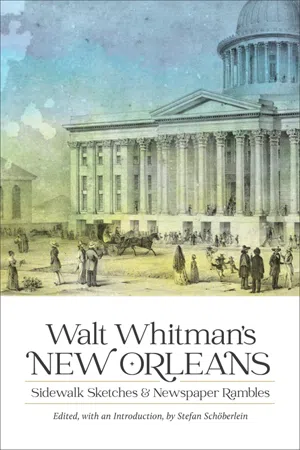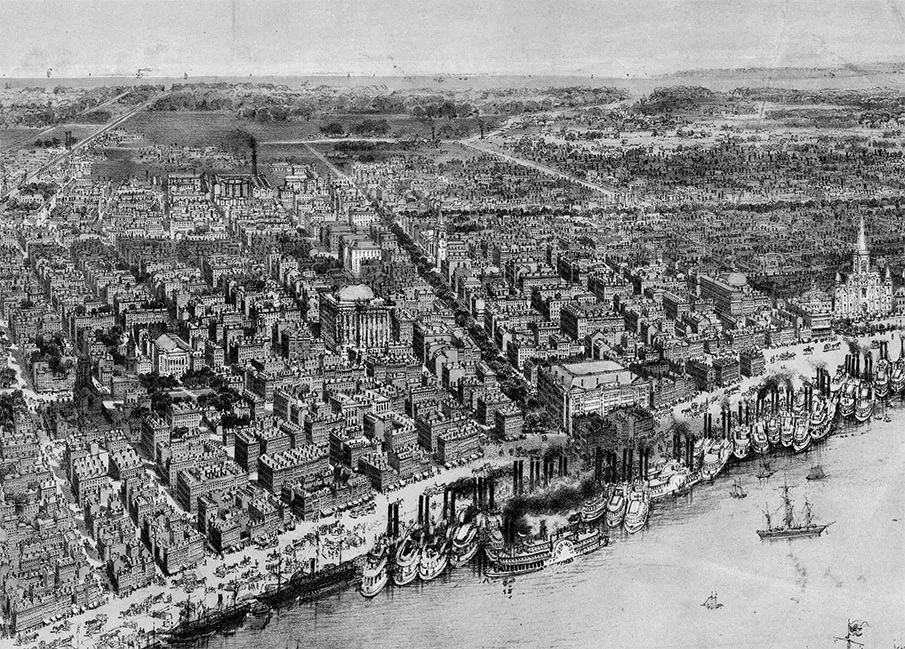![]()
SKETCHES of
NEW ORLEANS
REPORTER’S MOTTO.—By these presents be it known, that the Reporters for the daily newspapers of the city of New Orleans have, for a long time, desired a motto to be placed upon their coat of arms, etc. etc. As they have to walk some, we respectfully suggest that they adopt the Latin quotation of “Necessitas non habet LEG-em.”
—New Orleans Daily Crescent, May 11, 1848
Novelties in New Orleans
MONDAY, MARCH 13, 1848
We have frequently heard foreigners say that “New Orleans was a very beautiful place, but that, dem it, it had no places of amusement.” We throw back the remark, with the most excellent good humor, into their very teeth, and sincerely hope that, they may never have any thing worse than the best tooth-brush that can be procured to clean their masticators with. New Orleans without places of amusement! Why the very idea, gentlemen, is absolutely absurd. If there be any individual in the community who has Santa Anna’s favorite passion on the apex of his heart—which remark meaneth a furious desire to be present when the Gallic emblem of nationality spurs himself for the fight—he can at all times be accommodated in the lower municipalities. In certain locations he will be permitted to cry—“Crow, Chapman—Chapman, crow!” to the fullest extent of his lungs. Does the gentleman desire to see an Attakapas bull (just imported from Havana) speared by an artiste of celebrity? If so, his wish can be fulfilled by visiting Algiers and the Third Municipality, in the pleasant season of our Southern summer. As for masquerade Balls, we can only be beaten by gay, gallant, chivalrous Paris: and in the way of operas, we can’t be beaten at all. There’s the French opera at the Orleans Theatre, with its magnificent troupe; and occasionally we have those addicted to music from the “Father-land,” who sing to our uneducated ears, strains of the most mysterious sweetness.—Again, once or twice in the course of the theatrical season, we have gems of genius in the way of vocalists from the “sunny skies of fair, classic Italy,” who sing as if their very blood had been intermixed with the red currents that flow through the hearts of nightingales. Therefore, as Bombastes says—
“Since Music is the fool of love,
Play Michael Wiggins once again!”
If a person wishes to perforate his intimate friend or insolent enemy, he has only to go to some one of the numerous shooting-galleries in New Orleans, and by the joint aid of a few dimes and three days’ practice, he can be taught to split a bullet against the edge of a pen-knife, at the distance of ten paces. Those, too, who are fond of playing with edged tools, will, by applying to some of our fencing-masters, be taught how to “pink” a gentleman in a manner that Chevalier Bayard would have wept at. More than this could not be desired.
Bird’s Eye View of New Orleans, ca. 1850, by John Bachman (detail).
Library of Congress.
Now, as for our National Drama, we have all the materials necessary. Stars from Europe, from Britain, and, aye, sometimes from our own wild Western States, appear week after week at the different Theatres—which “temples of the drama” are, we suppose, better patronized than any others in “the land of the free and the home of the brave.” Those who come to visit us, albeit for a season, must never think that the Queen City of the South is deficient in amusements—for they can enjoy themselves at any thing in the way of drinking, from a glass of the waters of the muddy Mississippi, up to a golden goblet filled with Roman punch:—in the way of eating, from a mouldy sea-biscuit with a slice of rusty bacon, up to broiled, pompano with terrapin eggs and asparagus; and in the way of music, from the tooting of a penny whistle, up to a soul-
entrancing strain of a silver bugle, in the still, solemn hours of night.
The fact is, that in this goodly city, we can go through the whole alphabet of enjoyment, and, as they say in the West, “not miss a letter from A to Izzard.”
Firemen Celebration
SUNDAY, MARCH 5, 1848
The Annual Celebration of the Firemen of New Orleans took place yesterday, and although the commencement of the morning gave token of murky weather, still the indication did not dissuade them from turning out in full numbers. The sky was the color of lead, and the streets were ankle deep in mud—the air seemed to come from an ice house; but even as summer drives winter away, the streams of music from the different bands drove every cold, melancholy thought from the hearts of those who viewed the brilliant procession. Shortly after the appointed hour, the gallant concourse formed in line, and proceeded according to the programme through the principal streets. The procession was followed by the glance of the brilliant eye of beauty, and the acclamations of brave and gallant men. The engines were decked with flowers—the firemen were clad in their gayest suits, and every emblem gave token that it was a day of rejoicing to the philanthropic and the brave.
Oh, how proud it made one feel of this country, to see those stalwart men leading along the engines of peace, not of destruction—engines destined not to batter down the walls, but to preserve the threshold and the household gods of those who were their brothers! Their motto, like that of the ancient chivalry, was “Ready—aye—ready!” At glimmering morn, mid-day sun, grey evening, or gloomy midnight—aye, even when the rain hurtled against the shivering casement, and the lightning flashed—these brave men had been at their post. No danger could intimidate them—no struggle could bear down the strength of the firemen of New Orleans. Like brothers, at the first stroke of the alarm bell, they rush to their quarters—drag forth with almost super-natural strength their engines, and when they saved the lives of hundreds, and the property may be of thousands, peacefully retire to their homes.
Yesterday was the anniversary of the gallant firemen of New Orleans. The banner of the stripes and stars was waving in every street, and at every corner strains of music that stirred the soul were heard. At the appointed hour, the procession passed up and down the principal streets and the members were the “observed of all observers.” Shouts of applause rent the air as the splendid procession passed along; and as though Heaven had deigned to look smilingly upon the celebration, not an accident occurred to mar the festivities of the day. All was cheerfulness, joy and happiness, and our gallant firemen knew that they deserved and appreciated the compliments and congratulations that were yesterday so gladly lavished upon them.
At a few minutes before 3 o’clock the different companies entered the American Theatre, and after they had been seated the orator of the day, George W. Harby, Esq., delivered a most beautiful and impressive address. In a feeling and philanthropic tone he spoke of the duties of the fireman, and compared him not to the one who went forth to destroy, but to him who “girded his loins to save.” The remarks of the talented orator drew down bursts of applause, and we much regret that our columns will not allow us to give his oration in full. Suffice it to say, the address of Mr. Harby was marked by the imprint of genius, and certainly more than fulfilled the expectations of those who had chosen him as the orator of the day.
When the oration had been concluded, a select part of the firemen repaired to the Commercial Exchange, kept by Messrs. Clark & Hickok, where they were served with a splendid collation. Here the “red wine freely flowed,” and that gentle spirit peace, accompanied by her generous though somewhat boisterous brother, hilarity, as the old poem sayeth—
“Blessed the beeves, aye an the kine
Of all sorts—and the dulcet wine!”
The Sabbath
MONDAY, MARCH 6, 1848
Yesterday was a beautiful day—such a day as Wordsworth would have loved—and albeit, we have neither the silver Tweed nor the green-fringed Clyde to glide upon, still we had scenes that made us marvel at the beneficence
of our Maker. The gigantic Mississippi, bearing on her broad bosom many a royal argossie—the densely populated town, where man was at peace with his fellow-man, and where love and charity prevailed, and the forests of tall green trees that surrounded our prosperous city, all attested the kindness of the Ruler above. Business, for the most part, was suspended, and many there were who walked forth to contemplate the natural beauties which environed the “proud city of the South.” The living streams of human beings that flowed from the different houses of worship, showed that our citizens were not wanting in godliness, and the peace that prevailed proved that we dwelt together, as Scripture beautifully expresses it, “a loving community.” Those silent abodes of the dead, were not without their visiters. Many a tear was dropped upon the white tomb-stone covering the form of him who was dear in life, and who was not forgotten even though “dust had been given unto dust.” The heart of the mother wailed when she saw the tiny grave of her first born, and many a manly breast heaved with that emotion which sorrow only knows, when the pale ornaments built over the departed, came in view. Still, with all the cares and perplexities of life, Hope, the harbi...




